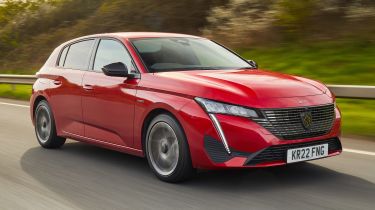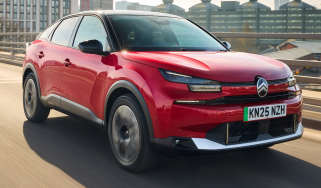New Peugeot 308 Hybrid 180 2022 review
Is the more modest 178bhp Peugeot 308 PHEV the pick of the new hatchback's range? We find out...

Verdict
Peugeot has seamlessly introduced hybrid power to the 308 and given it another dimension of desirability with a quality interior to rival those of some more upmarket models. The driving position remains an annoyance and it’s not the most fun car to drive, but it feels like the most accomplished entry in the family hatchback sector we’ve had from the French brand for a long time.
Peugeot’s 308 is available with a plug-in hybrid option for the first time, but the PHEV family car segment is already as competitive as it is congested.
We’ve previously had a taste of the hybrid 308 in range-topping GT Premium SW estate guise with the more powerful ‘225’ (222bhp) powertrain. This ‘180’ model offers up 178bhp and in middling Allure Premium spec it’s significantly cheaper, so is it the pick of the range and could it even be our favoured choice in the plug-in hybrid hatch sector?
With the likes of the SEAT Leon e-Hybrid, Volkswagen Golf eTSI and our former car of the year, the Skoda Octavia iV to contend with, the 308 Hybrid has a tough job to stand out from the crowd.
From the outside the omens are good. Allure Premium offers 17-inch diamond-cut alloys as standard and the ‘sabre-tooth’ daytime running lights are certainly eye-catching. It looks as fresh as any of its rivals and that’s before we get to the swanky interior.
Used - available now
The Peugeot 308’s cabin is its party piece. As a statement, the design is up there with even the Audi A3 and BMW 1 Series - cars this Peugeot can rival for quality too. Whatever spec you choose, the 308 delivers some classy touches such as a frameless rear view mirror, rear parking sensors, sport pedals and plenty of piano black finishing. On top of that, this Allure Premium trim level offers eight-colour ambient lighting, ‘Falgo tri-material’ dynamic seats, a reversing camera, keyless entry and wireless phone charging.
There’s also an impressive amount of driver safety tech on board with the ‘Driver Assist Pack’, featuring rear cross traffic alert, adaptive cruise control with stop and go as well as long range blind spot protection.
Peugeot’s i-Cockpit is the key ingredient to the interior, however. We’ve seen it before but the 308 introduces ‘i-Toggles’ for the first time. Below the 10-inch touchscreen sits a selection of touch sensitive pads which are used for menu shortcuts, they can also be reconfigured to give quick access to your most commonly used menus. While the pads themselves are big and easy to use on the move, it’s tempting to rest your wrist on these i-Toggles to use the touchscreen - often taking you to an unwanted menu.
The infotainment screen in the 308 is crisp and simple to use but the 10-inch digital screen ahead of the driver is less user-friendly. A key component of Peugeot’s i-Cockpit in recent years has been the shrunken steering wheel - designed to give the cars a sportier feel. The flip side of this is that the flat top of the wheel means the dials are impossible to read for most, you have to sit quite high up and look over the wheel to view them.
That’s really our only gripe on an interior which is festooned in high-quality materials throughout and has a decent amount of storage options. Rear occupants won’t feel too cramped, a Golf feels more airy but there’s much more space than in a Mazda 3.
Boot space is also fairly average for this class. Peugeot isn’t immune to losing luggage capacity with the introduction of plug-in hybrid tech, it appears, with the 308 hatchback going from 412 litres to 361 in this hybrid version. Fold the rear seats flat and you get a commodious 1,271 litres.
Just like the 225 model, the 180 uses a 1.6-litre, four-cylinder petrol engine mated to an 81kW electric motor. Despite being the lower-powered of the two hybrids by a significant chunk on paper (178bhp versus 222bhp), an identical 360Nm of torque helps narrow the 0-62mph time to just 0.1 seconds - the Hybrid 180 will do it in 7.6 seconds compared to the Hybrid 225’s 7.5 seconds.
The same eight-speed automatic gearbox is used across the 308 range and it further closes the gap between the two hybrid powertrains to the point where you struggle to really spot the differences on the road. The transmission itself isn’t the smartest, sometimes taking too long to shift up or down or shifting up at the wrong time in the name of fuel efficiency. Stick it in manual mode, use the paddles and gear changes become surprisingly rapid while still remaining smooth.
There are three modes for drivers to choose from; Sport, Hybrid and Electric. Sport gives the steering a little more weight and the gearbox becomes slightly more keen to hold onto its gears but there’s not much change over Hybrid mode. Electric mode causes the petrol engine to shut off for up to 40 miles of EV driving on a full battery, but annoyingly this mode is overridden if you press on the accelerator too firmly - the petrol engine kicks in and you’re put back into Hybrid mode.
Turn on the brake regeneration button next to the gear lever and you’ll find it to be quite aggressive at first, but it learns your inputs with the accelerator and accordingly changes its level of braking force. It seems to reset each time the ignition is switched off, however, which is a slight frustration.
On the move the 308 is pretty well-sorted dynamically. The damping is softer than in many of its rivals and it's clear Peugeot has veered slightly more towards comfort than agility in its family hatch. This lack of dynamism can be felt in the corners to an extent, but there’s plenty of grip and while the steering is a tad vague the chassis is tight and communicative enough. All this, coupled with the relatively quiet powertrain, means that racking up long distances in the 308 Hybrid 180 is no chore.
Peugeot says 247.4mpg is what the 308 Hybrid 180 will return on the combined cycle. As usual with plug-in hybrids, we’re somewhat sceptical of this in the real world where owners might not necessarily be making the most of the electric motor. Driving around on petrol power with the weight of a dead battery will see that figure barely get above 40mpg.
At £33,935, the 308 Hybrid 180 is more expensive than a SEAT Leon e-Hybrid but, perhaps crucially, it undercuts a similarly-specced Volkswagen Golf eTSI, it feels more premium inside than its German counterpart too. A range of strong engines means that whatever 308 you choose it’s one of the better family hatchbacks on sale.
| Model: | Peugeot 308 Allure Premium Hybrid 180 |
| Price: | £33,935 |
| Engine: | 1.6-litre 4cyl petrol PHEV |
| Power/torque: | 178bhp/360Nm |
| Transmission: | Eight-speed automatic, front-wheel drive |
| 0-62/top speed: | 7.6 seconds/139mph |
| Economy/CO2: | 247.4/27g/km |
| Electric range: | 40 miles |
| On sale: | Now |















